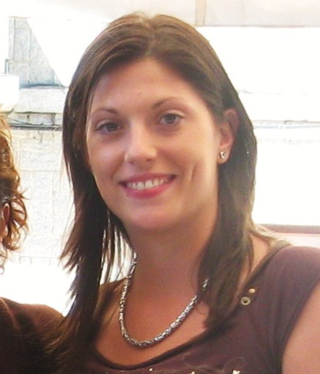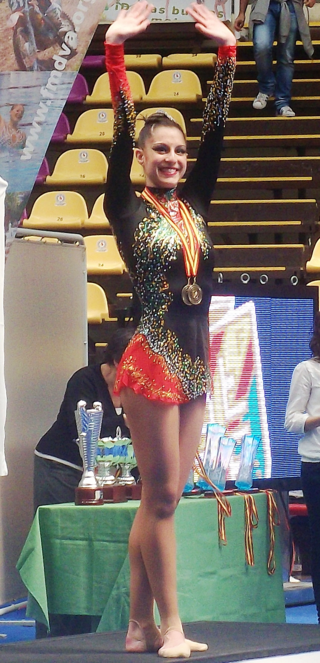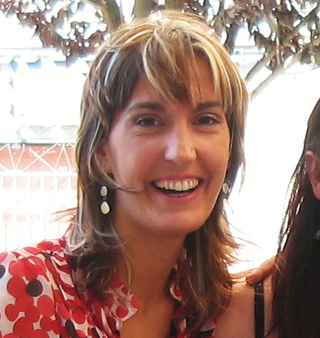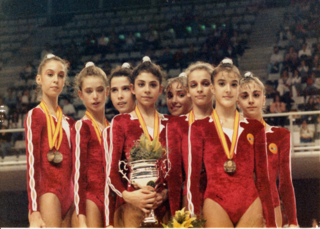
Rhythmic gymnastics is a sport in which gymnasts perform on a floor with an apparatus: hoop, ball, clubs, ribbon and rope. The sport combines elements of gymnastics, dance and calisthenics; gymnasts must be strong, flexible, agile, dexterous and coordinated. Rhythmic gymnastics is governed by the International Gymnastics Federation (FiG), which first recognized it as a sport in 1963. It became an Olympic sport in 1984, with an individual all-around event. The group all-around competition was added to the Olympics in 1996. At the international level, rhythmic gymnastics is a women-only sport. The most prestigious competitions, besides the Olympic Games, are the World Championships, World Games, European Championships, European Games, the World Cup Series and the Grand Prix Series. Gymnasts are judged on their artistry, execution of skills, and difficulty of skills, for which they gain points. They perform leaps, balances, and rotations along with handling the apparatus.

Almudena Cid Tostado is a former Spanish individual rhythmic gymnast who competed on the Spanish national team. She is the only rhythmic gymnast who has competed in four Olympic finals.
These are the results of the rhythmic individual all-around competition, one of the two events of the rhythmic gymnastics discipline contested at the 2004 Summer Olympics. The qualification and final rounds took place on August 27 and August 29 at the Galatsi Olympic Hall.

Tania Lamarca Celada is a former Spanish rhythmic gymnast and Olympic medallist. She won a gold medal with the Spanish group at the 1996 Summer Olympics in Atlanta. The team was formed by Tania, Estela Giménez, Marta Baldó, Nuria Cabanillas, Lorena Guréndez and Estíbaliz Martínez. Also she was two times world champion in 3 balls/2 ribbons.

Lorena Guréndez García is a Spanish rhythmic gymnast and Olympic Champion. She competed at the 1996 Summer Olympics in Atlanta, and won a gold medal with the Spanish group. The team was formed by Lorena, Estela Giménez, Marta Baldó, Nuria Cabanillas, Estíbaliz Martínez and Tania Lamarca. Also, she was twice world champion: one in 3 balls/2 ribbons and other in 3 ribbons/2 hoops.

Carolina Rodríguez Ballesteros is a retired Spanish rhythmic gymnast. She is a veteran of the sport who started her senior career in the early 2000s. She competed in three Olympic cycles: at the 2004 Athens where she was member of the Spanish group, at the 2012 London competing as an individual gymnast where she finished 14th in all-around qualifications and at the 2016 Rio competing again as an individual, finishing in 8th in the rhythmic gymnastics individual all-around final.
Isabel Benavente, is a former Spanish rhythmic gymnast.

Ana María Pelaz Mota, also known as Ana Pelaz, is a former Spanish rhythmic gymnast who competed with the group at the Olympics in Beijing 2008. She won medals in various international competitions. From 2014 to 2020 she was the coach of the national junior group, and since September 2020 she is the coach of the senior group together with Alejandra Quereda at the CAR in Madrid.

Marta Aberturas Rubio is a former Spanish rhythmic gymnast. She was World champion in 1991 with the rest of the Spanish group, in addition to achieving numerous other medals with the Spanish national rhythmic gymnastics team. The generation of gymnasts that she joined is known by the nickname of the First Golden Girls.

Clara Esquerdo is a Spanish former rhythmic gymnast who competed with the national group of Spain.

Sara Bayón is a Spanish former rhythmic gymnast, former team coach of the Spanish national rhythmic gymnastics group, and current coach of the French group. She is the only Spanish gymnast who has been world champion as an athlete and as a coach, being world champion in 3 ribbons and 2 hoops in Seville 1998, and as a coach, in 10 clubs in Kyiv 2013 and Izmir 2014.

Natalia García Timofeeva is a retired Spanish rhythmic gymnast who was a member of Spain's national rhythmic gymnastics team from 2008 until her retirement in 2021. She has been 5 times nation champion counting all categories: 1 in alevín (2005), 2 in children, 1 in junior (2008) and 1 in junior honor (2009). She has also been 6 times national silver medalist as a senior and won bronze in 2019. She retired on 13 November 2021 at the 6th Ciutat International Trophy in Barcelona after more than 20 years in the world of gymnastics.

Emilia Boneva was a Bulgarian coach in rhythmic gymnastics and head coach of the Spanish national team from 1982 to 1996. Her achievements included the Olympic gold won by the Niñas de Oro in Atlanta 1996, Carolina Pascual's silver medal in Barcelona 1992. Among other awards, she received the silver medal of Royal Order of Sports Merit (1994).

María Fernández Ostolaza is retired Spanish rhythmic gymnast and coach. As a gymnast she's a European bronze medalist, as a trainer she led the group to international success.

Maider Esparza Elizalde is a former Spanish rhythmic gymnast, who was a substitute for the two-time world champion and gold medalist at the 1996 Atlanta Olympic Games national group, although for that event only the six starting gymnasts were allowed to be called up.

María Teresa Fuster Amades, also known as Bito Fuster or Teresa Fuster, is a retired Spanish rhythmic gymnast. She was World champion in 1991 and two-time European champion in 1992. The generation of gymnasts that she was part of is known by the nickname "Primeras Chicas de Oro". Fuster is tied with Lorea Elso, Marta Baldó and Estela Giménez for the Spanish rhythmic gymnast with the most medals in World Championships, with a total of 8. She was also part of the Spanish female rugby national team.

Montserrat Martín López, also known as Montse Martín, is a retired Spanish rhythmic gymnast, graphic designer, painter, illustrator, actress and dancer. She was World champion in 1991 and two-time European champion in 1992. The generation of gymnasts that she was part of is known by the nickname "Primeras Chicas de Oro".

Maider Olleta Pérez is a retired Spanish rhythmic gymnast. She is a double bronze medalist at the European Championships.

Paula Orive Ozores is a retired Spanish rhythmic gymnast. As a member of the senior group she is a European and World medalist.

Jennifer Colino Guerra is a retired Spanish rhythmic gymnast and coach. As part of the Club Atlético Montemar she is a multiple national champion.















